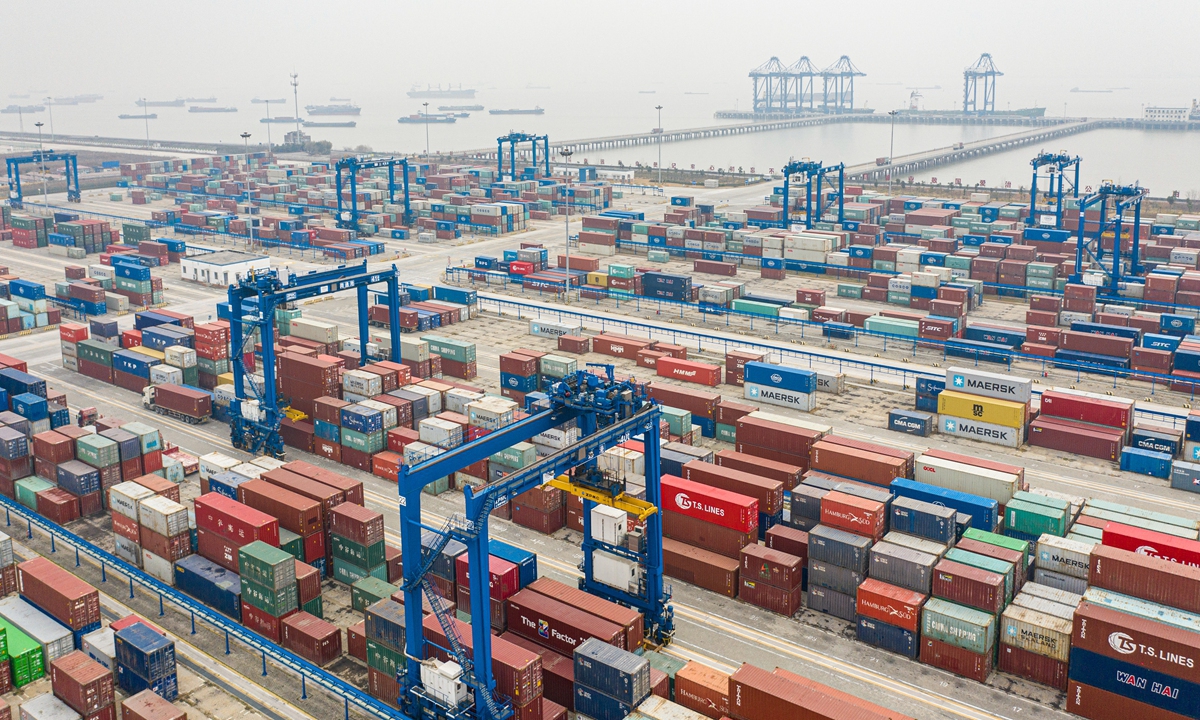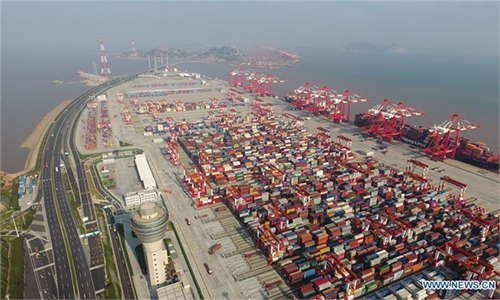
File photo: cnsphoto
While China's construction of a port logistics data platform seems to be becoming a new field to target among US politicians in containing China's trade network, given China's important role in global shipping industry and trade chains, the country's advantage in promoting a Chinese logistics data platform is unshakeable despite US political pressure.The US Congress passed legislation that would ban the Pentagon from using any seaport in the world that relies on a Chinese logistics platform known as LOGINK, according to a recent Voice of America (VOA) report.
These days, it is not surprising to see US politicians attempt to play up the so-called threats to US national security, which could involve everything from China. The legislation about China's LOGINK platform is just another example of such clichéd political plays.
The only reason US politicians have introduced "security issues" into this field to smear China's overseas port cooperation may be their fear that China could make use of its cargo trade network to build a digital logistics advantage. But what they didn't mention is that digitalization has become the key to the transformation and development of the global port and shipping industries.
LOGINK and similar digital platforms at the world's major cargo ports are aimed at providing an information exchange database for traders and shippers, allowing them to share and access relevant information such as cargo transport, ship locations and port conditions, so as to improve the efficiency and reliability of maritime transport.
Why don't they just focus more energy on improving their own construction of logistics platforms, instead of pan-politicizing other's progress?
To a certain extent, the US alarm about China's digital logistics platform reflects the latter's prowess and unique advantages in promoting the development of digital logistics platforms and other port cooperation.
LOGINK has partnerships with more than 20 ports globally, including those in Japan, South Korea, Malaysia, Portugal, Spain and other countries and regions, as well as many Chinese and international firms, according to media reports.
The global development and widespread use of LOGINK make economic sense. China is the world's largest trader of goods, and a major trading partner of more than 140 countries and regions. China now boasts the world's largest merchant fleet in gross tonnage terms, edging past Greece, according to data from Clarksons Research, a London-based company specializing in data and analytics in the maritime industry.
With global ports becoming greener, more digital and information-driven, it is totally justified for China to participate in and contribute its share to the construction of global port logistics data platforms. It is hard to imagine that any port's logistics platform wouldn't have any participation by Chinese companies.
Indeed, shipping and port operations are highly international industries, where multinational companies from Europe, Japan and elsewhere are deeply involved. The US exaggeration of the "security threat" posed by China's data platform cooperation with overseas ports looks paranoid and biased.
The close attention that the US has paid to China's platform for sharing logistics information may serve as a reminder of the growing urgency in pushing forward with the construction of global port and trade chains in the current China-US rivalry. The US-China Economic and Security Review Commission had warned about the economic and strategic risks in China's LOGINK platform in a September 2022 report.
Thus, at the critical juncture of the accelerated restructuring of the international shipping industry, it is essential for China to make every effort to develop the logistics platform to enhance competitiveness in the global trade and shipping fields.
As long as the platform is in line with global trade norms and the needs of port countries, there is every reason to believe the healthy competition and digital transformation will be welcomed by most countries in the world.



